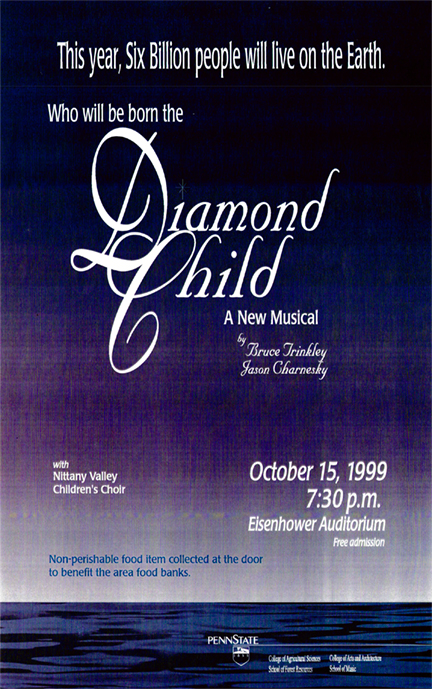For Young Audiences
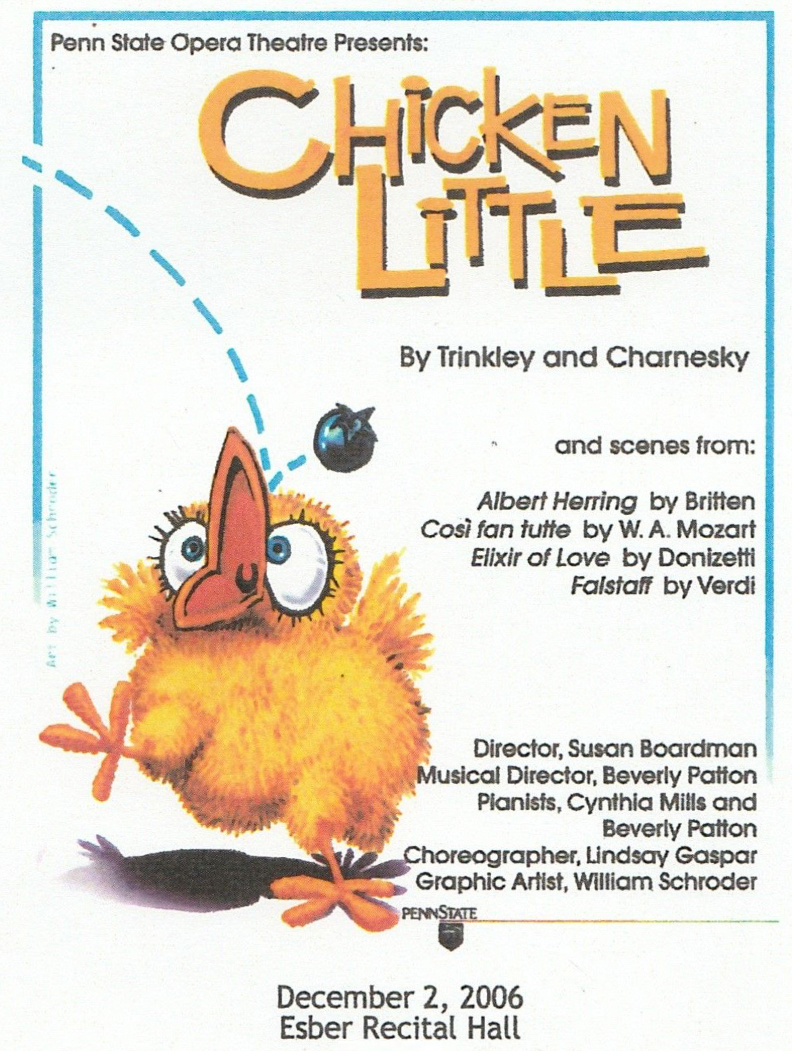
Chicken Little A Fable for Wise Children
Finalist, 2009 NOA Chamber Opera Competition
A new version of the old tale. Appropriate for young college-age or high school singers. Easy to stage with many melodies. The baritone playing Foxy Loxy should be able to sing an approximation of contemporary hip-hop.
Foxy Loxy, baritone
Chicken Little, higher voice
Goosey Loosey, higher voice
Warbler, higher voice
Henny Penny, middle voice
Turkey Lurkey, middle voice
Wren, middle voice
Ducky Lucky, lower voice
Quail, lower voice
Chorus of Birds (optional)
Accompaniment: Piano or chamber ensemble
Duration: 25 minutes.
Read Notes. Download Piano Vocal Score.
Listen to Premiere by Penn State Opera Theatre, December 2, 2006.
Commission and Premiere:
Penn State Opera Theatre,
Susan Boardman, Director. Productions by opera companies throughout the country.
Christmas for King Midas
One act opera for Young Audiences (middle/high school)
Just before Christmas, Miss Pettigrew is aghast to find her students would rather be at the mall shopping. She has them enact the fable of King Midas whose love for gold turns his wife, son, and his beloved nachos to solid gold.
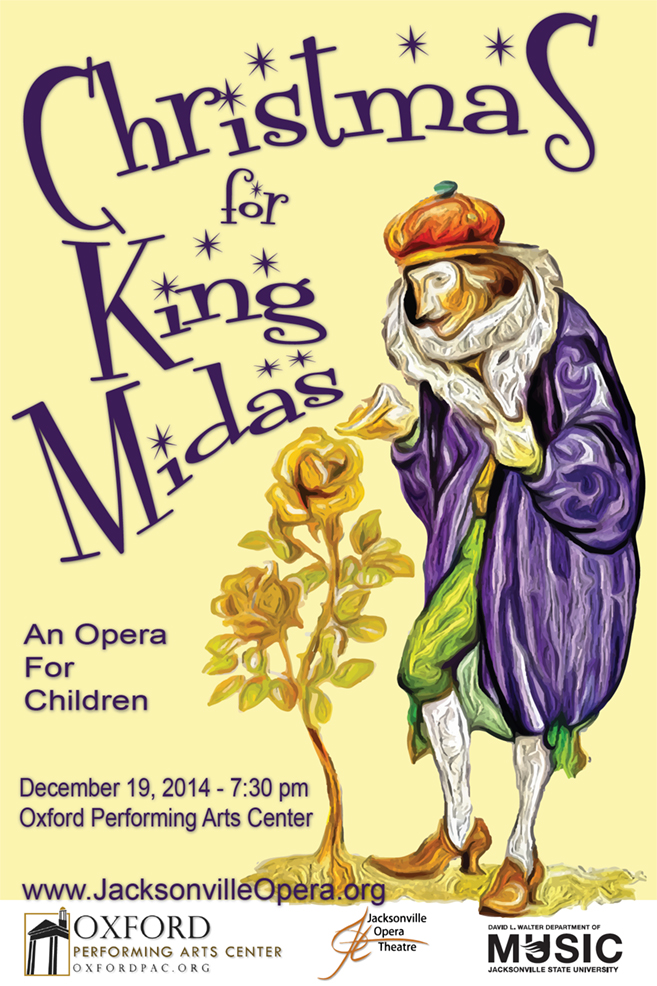
Nan/Angel, high soprano
Kathy/Princess Dividend, soprano
Miss Philomena Pettigrew, soprano or mezzo-soprano
Sissy/King Midas, mezzo-soprano or soprano
Rose/Rosebush, mezzo-soprano or contralto
Dan/Prince Vague, high baritone or tenor
Accompaniment: piano or chamber orchestra
Duration: 45 minutes
Read Notes and Orchestration.
View Piano Vocal Score.
Listen to midi of Part One (pages 1-10).
Listen to midi of Part Two (pages 11-20).
Listen to midi of Part Three (pages 21-30).
Listen to midi of Part Four (pages 31-41).
Listen to midi of Part Five (pages 42-50).
Listen to midi of Part Six (pages 51-60).
Listen to midi of Part Seven (pages 61-76).
Listen to midi of Part Eight: Finale (pages 77-82).
Read article in The Chanticleer, Jacksonville State University.
Commission and Premiere: Jacksonville State University Opera Theatre,
Nathan Wight, Director; Jeremy Benson, Conductor; September 13, 2014.
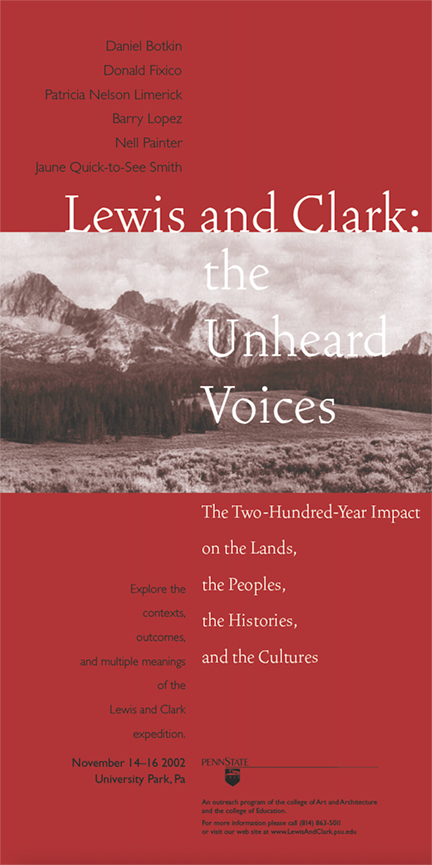
Lewis and Clark: The Unheard Voices
After Jason Charnesky and I wrote the cantata The Last Voyage of Captain Meriwether Lewis (featured on the Cantatas page), we became even more aware of the significance the upcoming Lewis and Clark bicentennial could have on the American public. We conceived and organized a conference to present voices that might be missed in the general bicentennial clamor.
Lewis and Clark: The Unheard Voices was the title of that international conference held at Penn State on November 14-16, 2002. The conference examined the influence of the Lewis and Clark Expedition of 1804-1806 on the peoples, the land, and the history of “The West” through which the expedition passed. Unlike most of the Bicentennial observations, Unheard Voices sought to give voice to the lasting impact on the environment and the peoples of the western lands, and strove to relate the yet untold stories of that expedition.
The centerpiece of the conference was the premiere of a full-length opera, YORK: The Voice of Freedom, about the only African-American on the Expedition. York, William Clark’s personal slave since childhood, traveled with the men on the journey to the Pacific. On the expedition York did things that were forbidden, or actually illegal, for him in the slave states. He carried a gun. He voted. He was treated with respect and reverence by certain Native peoples to whom York’s black skin was interpreted as a mark of exceptional rank and honor.
When the expedition returned to St. Louis, each member of the expedition received double pay, land grants and great acclaim for their adventures and triumphs. But alone of all the men who journeyed West, York was never paid or given recompense for his labor. In fact, he was returned to another 15 years of servitude. The opera celebrated perhaps the most important but most unknown of those voices, the life of York.
The third and final part of my personal creative journey with Lewis and Clark came when Tim Fink (head of the opera program at Illinois State University at Carbondale) requested an opera that he could use in his outreach program to schools in the midwest. A scene from the York opera which had to be cut involved the expedition discovering, then spending the whole day trying to capture, a prairie dog. This caught creature was eventually delivered to President Thomas Jefferson. We fleshed out this sketched scene and expanded it into a work that tells the story of the prairie dog and a magpie that travel from the far West to Washington D.C., encountering creatures from many environments along the way until finally meeting with the President. The piece taught a bit of history while at the same time explaining and demonstrating what an opera is and how it works. There are even sing-along sections which involve the young audiences directly in the action of the performance.
The Prairie Dog That Met the President completes the unplanned trilogy of works which grew out of my encounter with the Lewis and Clark story. Each is shaped with a message that encourages its audience to attend to the unheard stories of American history. I hope you take the time to explore all three of these works. They are products of my “Journey West.” Each is tuneful, engaging and dramatic – and educational to boot.
Read: The Good Word, a description of the Conference.
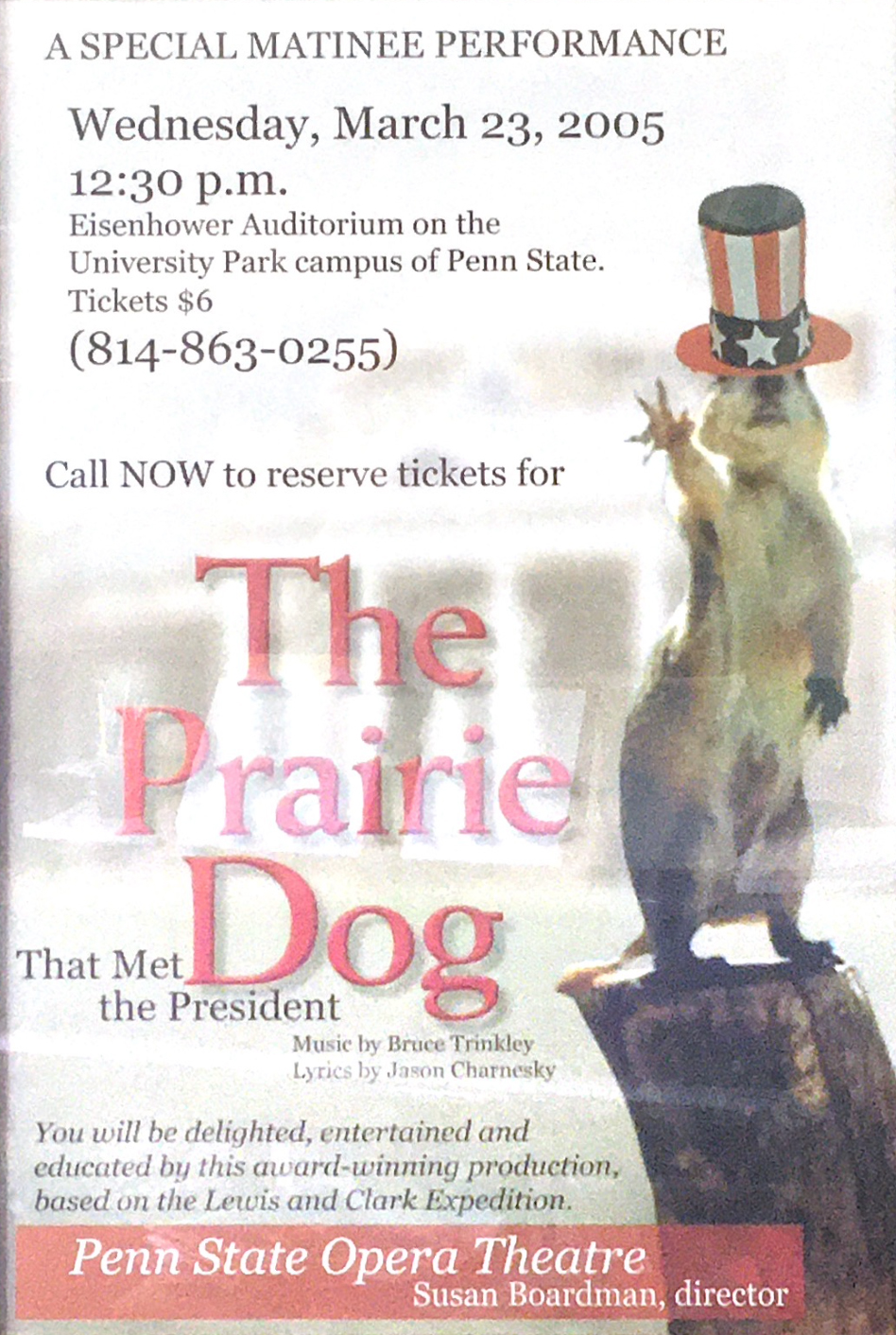
The Prairie Dog That Met the President
One act opera for Young Audiences (any age level)
Finalist, 2005 NOA Chamber Opera Competition
Based on a true incident from the Lewis and Clark Expedition of 1804, this romping tale tells of the Prairie Dog found in a prairie dog town on the banks of the Missouri and sent back to President Jefferson in Washington. The Magpie serves as Mistress of Ceremonies and opens the piece with an engaging definition of opera, which leads into her inviting the audience to participate in the opera: she teaches the children in the audience a song to sing to the Prairie Dog when the plot demands action. The song is taught by rote and then rehearsed by the Magpie. And during the course of the opera, the young people are prompted to sing the song when they want the Prairie Dog to do something – like hop – or sing:

Magpie (Mistress of Ceremonies), soprano or mezzo-soprano
Prairie Dog, tenor or high baritone
Soprano, playing the roles of William Clark, Sacajawea, First Flamingo, Baltimore Oriole
Mezzo-soprano, playing the roles of Meriwether Lewis, Brown Pelican, with optional alto or tenor sax solos, Second Flamingo
Baritone, playing the roles of Ordway, Seaman, Third Flamingo, Thomas Jefferson
Accompaniment: Piano or piano and woodwind quintet or string quintet
Duration: 40 minutes
Read production notes.
View Piano Vocal Score.
Notes.
Teaching Guide.
Youtube video of Southern Illinois University Carbondale production
Commission and Premiere: Southern Illinois University Carbondale, Tim Fink, director; Penn State Opera Theatre, Susan Boardman, director. Multiple performances throughout US
Commission and Premiere of String Quartet Vesion: Clayton State University, Morrow, Georgia, Dr. Kurt-Alexander Zeller, director.
The Diamond Child A Fable for the Future
The sixth billionth human child is about to be born. The child’s parents are given one wish by Mother Earth, but they must choose wisely.
Mère Mer (Mother Earth), soprano or mezzo-soprano
Tod (American), high baritone or tenor
Mary (Tod’s wife), soprano
Paul (Tobago native), tenor
Sylvia (Paul’s girlfriend), alto
Aloon, baritone (Guinean)
Faheen (Aloon’s wife), mezzo-soprano or alto
Xiao Bin [She-owl Been](Chinese), high baritone or tenor
Li Yu [Lee You](Xiao Bin’s wife), soprano or mezzo-soprano
Children’s choir (for the finale)
Accompaniment: Piano with optional Clarinet, Drum Set, Djembe drum, String Bass
Duration: 80 minutes.
Download Piano Vocal Score.
View cast descriptions. View synopsis and list of songs.
View Youtube video of Premiere at Penn State, Eisenhower Auditorium, October 15, 1999.
Commission and Premiere: College of Arts and Architecture and Department of Forest Resources, Penn State University. Bob Barton, Director; Leah Asbell Swanger, Designer; Laura Hanshar, Costume Designer.
Dedicated to Charles Dumas, with gratitude and admiration.
COMPOSER NOTE: The one-act musical was written to mark The Day of Six Billion, the day the United Nations designated as when the population of the earth would exceed 6 billion: October 12, 1999. (See also The Day of Seven Billion and EarthSky.) As Charnesky said in an interview, “The real question is, what can we do now to make the world better for our children?”
Dear Mother Earth is the powerful SATB finale, sung first by the cast, and then joined by the children’s choir who appeared magically behind the mesh walls of Eisenhower Auditorium. Finally the cast invited the entire audience to join them and the children’s choir in singing the anthem. It was a powerful and unique ending to a powerful and unique musical and theatrical experience.
View the finale on Youtube with cast, children’s choir and audience. (1:11:55)
Download the score to Dear Mother Earth. (Open a separate browser and click on the video link to view the score and watch the finale simultaneously.)
Charnesky’s powerful lyrics show that The Diamond Child now has greater import and significance than ever.
in the world we try to build.
O dear Mother Earth, O dear Mother Earth,
how spacious your girth that shelters
the children that dance into birth!
O parents so true, be sure that you choose
the future that is best for your children to use.
We learn and we play. And wait for the day
that we too are grown ups and help to choose the way.
Our future is shared, six billion to spare.
Our world is decided by what we do here.
The future is now. You must teach us how
the family of man can be true to this vow:
Love to learn. Learn to share.
Share to live and live to care.
One Act Operas

Ever Since Eden
The next three operas: Eve’s Odds, Golden Apple and Cleo form a trilogy entitled Ever Since Eden. Each opera depicts a woman at a moment of choice for herself and for posterity. Each opera may be performed separately or any two of them as a double bill. Total duration: 2 hours 25 minutes. The two pocket operas Apple Chat and Vergil and Flora are derived from Eve’s Odds and Golden Apple.
Please note that Golden Apple was originally titled Dido Decides until the authors heard a radio announcer calling the piece “dee-do deh-chee-des” thinking it was an Italian opera, and obviously having no idea who Dido was! So the piece was quickly renamed - but the posters still recall the fate of the Carthaginian Queen and her moment of choice . . .
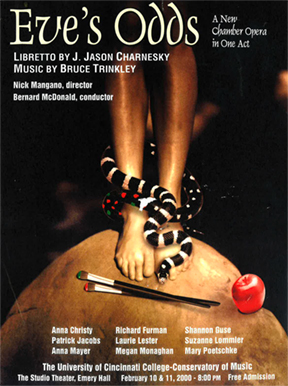
Eve’s Odds
A Musical Midrash/One-act Comic Chamber Opera
Winner, 1999 NOA Chamber Opera Competition
A retelling of the Eden story that shows why Eve really ate the apple.
Eve, soprano
Snake, baritone
Adam, high baritone/tenor
Lilith, mezzo-soprano
Bad Angel, mezzo-soprano or alto
Guardian Angel, coloratura soprano
Angel Chorus, solo trio or double trio or triple trio or 3-part treble chorus
(Several productions have taken advantage of the opportunity to collaborate with the institution’s treble chorus.)
Accompaniment: Piano or chamber orchestra
Duration: 45 minutes
Read synopsis. View Piano Vocal score.
View Youtube of Premiere by Penn State Opera Theatre, Susan Boardman, Director.
View Youtube of Eve's Odds by Western Michigan University, Carl Ratner, Director.
Commission and Premiere: Penn State Opera in the Pavilion, Susan Boardman, director. April 1997.
Productions: 2000 NOA convention by the Cincinnati College-Conservatory of Music, Nick Mangano, Director; Bernard McDonald, Conductor Penn State Opera Theatre, Syracuse Opera Theatre, University of Southern Utah; Union University, Samford University Otterbein College, California State University, Davis; Columbia College (S.C.), Briar Cliff University (Iowa), University of Wisconsin Whitewater; Emporia State University, Western Michigan University; and others.
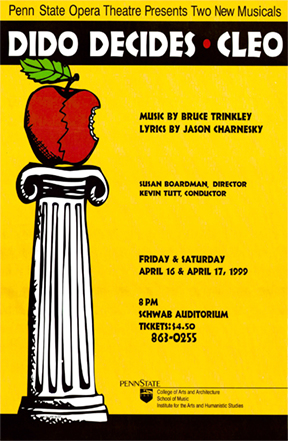
Golden Apple
A Roaming Holiday: One-act Tragi-comic Chamber Opera
Finalist, 1999 NOA Chamber Opera Competition
The Roman poet Vergil is having trouble writing his poem about Aeneas, until all the characters of his poem come alive to show him what really happened.
Dido, soprano
Aeneas, high baritone or tenor
Vergil, baritone
Flora, mezzo-soprano or contralto
Julia, soprano
Semi-chorus of Trojan Soldiers, tenor and bass quartet, double quartet or full chorus
Semi-chorus of Carthaginians, SATB quartet, double quartet or full chorus
Accompaniment: Piano or chamber orchestra (Full score and parts available from the composer)
Duration: 60 minutes
Read Synopsis. View Notes and Orchestration.
Download Piano Vocal score.
View Youtube of Premiere by Penn State Opera Theatre (titled Dido Decides in this production).
View Youtube of Golden Apple by Western Michigan University, Carl Ratner, Director.
Commission and Premiere: Opera in Schwab, Penn State Opera Theatre, Susan Boardman, director. April 1999. Productions: Otterbein College, California State University-Davis, Western Michigan University, others.
Golden Apple is dedicated to the memory of Russell Falt, my first music teacher, my musical mentor, and my dear friend.

Cleo
One-act Cinematic Farce
Winner, 2001 NOA Chamber Opera Competition
On the set of the movie Cleopatra, Elizabeth Taylor must choose between her husband Eddie Fisher and her lover Richard Burton.
Elizabeth Taylor, soprano or mezzo-soprano
Eddie Fisher high baritone or tenor
Richard Burton, baritone
Mara, soprano
Charmion, mezzo-soprano
Iras, contralto
The Director, speaking role
SATB Chorus
(Semi-choruses drawn from the main chorus: Clapstick Crew; Camera Crew; Sound Crew; Studio Executives; Movie Extras; Student Actors)
Accompaniment: Piano or chamber orchestra (Full score and parts available from the composer)
Duration: 30 minutes
Read synopsis. View orchestration.
Download Piano Vocal score.
View Youtube of Premiere by Penn State Opera Theatre, Susan Boardman, Director.
View Youtube of Cleo by Western Michigan University, Carl Ratner, Director.
Commission and Premiere: Opera in Schwab, Penn State Opera Theatre, Susan Boardman, director. April 1999.
Productions: 2002 NOA Convention by Temple University Opera, John Douglas, (1956-2010) Conductor; Doug McDonough, Director; California State University, Hayward; University of Wisconsin-Whitewater; Western Michigan University, Kalamazoo.
Cleo is dedicated to the memory of Clair Trinkley (1931-1998), who loved the movies and admired the people who made them.
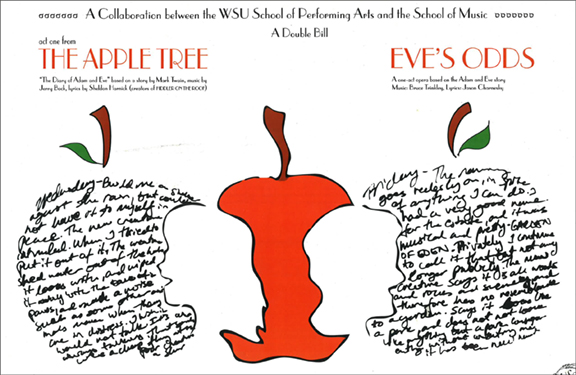
Apple Chat
Pocket Opera for Soprano or Mezzo-soprano, Tenor or Baritone and Piano or Chamber Ensemble The opening scene from Eve’s Odds as a stand-alone comic scena for Eve (soprano) and The Snake (baritone) as they discuss their friendship and debate the state of the apple.
Eve, soprano or mezzo-soprano
Snake, tenor or baritone
Duration: 12 minutes.
Read synopsis.
Download Piano-vocal score. Listen to midi.
Vergil and Flora
Pocket Opera for Soprano or Mezzo-soprano and Baritone and Piano or Chamber Ensemble
In this extended scene from Golden Apple Vergil is waking up from a night of drinking with visions of his new poem. His servant and muse Flora chides him for his lack of commitment to the commission from the Emperor and points the way to success, achieved only by dedicated hard work.
Flora, Vergil’s servant, soprano or mezzo-soprano
Vergil, Roman poet, baritone
Duration: 11 minutes.
Read synopsis. Read libretto.
Download Piano Vocal score. Listen to midi.

The Fish, The Fisher and The Wife
A Grimm Fable for Modern Times
A modern day update of the Brothers Grimm fable, The Flounder. When a fisherman is given 7 wishes, his wife puts them to use for her own ambitious schemes.
The Fish, soprano or mezzo-soprano
The Wife, mezzo-soprano or soprano
The Fisher, high baritone or tenor
Maid/Press Secretary/Speaker of the House, soprano
Cook/State Trooper/Presidential Chief of Staff, mezzo-soprano or alto
Guard/Gubernatorial Chief of Staff/Joint Chief of Staff, tenor
Consultant/Chairman of the Federal Reserve, baritone or bass
Accompaniment: Piano or chamber orchestra (Full score and parts available from the composer)
Duration: 40 minutes
Read cast, note and synopsis.
View Piano Vocal score.
Commission and Premiere: Emporia State University Opera Theatre, Penelope Speedie, Director; Jeremy Starr, Conductor.
Watch YouTube Premiere of Version with orchestra: Jacksonville Opera, Nathan Wight, Director. September 14-16, 2012.
Lorenzo’s Ashes
Chamber Opera in One Act
The British author D. H. Lawrence is dead and the three women who loved him vie with each other over the rights to his memory and his ashes.
Lorenzo’s Ashes is a memory play in which three women relive their passionate involvement with the English novelist D. H. Lawrence. Set outside Taos, New Mexico, on Lawrence’s
Kiowa Ranch, in the 1920s, the opera tells the true and amazing story of how that spot came to be Lawrence’s final resting place.
Frieda Lawrence (1879 –1956), his widow, wishes his ashes to be entombed in a memorial on the ranch. She sends her Italian lover Angelo to France to retrieve Lawrence’s ashes. Two other women, however, oppose this plan.
Mabel Dodge Luhan (1879 – 1962), an American heiress, and Lady
Dorothy Brett (1883-1977), a British painter, both former intimates of Lawrence, wish to release the ashes into the New Mexican wilderness. While fighting over the fate of Lorenzo’s ashes, all four characters confess startling secrets and reveal how the force of Lawrence’s art shaped their lives – and afterlives – forever.
NOTE: The premiere included A Prologue in Letters by the four performers drawn from the writings of the three women. The opera followed this introduction.

Dorothy Brett, soprano or mezzo-soprano
Mabel Dodge Sterne Luhan, mezzo-soprano or soprano
Frieda Lawrence, contralto or mezzo-soprano
Angelo Ravagli, high baritone or tenor
Accompaniment: Piano and optional string bass
Duration 40 minutes
Read Note.
Download Piano Vocal score.
Read A Prologue in Letters.
Listen to spoken prologue.
Read Libretto. Listen to Premiere performance of the opera.
Premiere:
Harwood Museum of Art, Taos, New Mexico. Celebrating
Remarkable Women of Taos & Northern New Mexico 2012.
Richard Edelman, Director.
Lorenzo’s Ashes is dedicated to the memory of Helene Wurlitzer (1874-1963), Founder and Benefactor of the Wurlitzer Foundation; and Henry Sauerwein, founding director of the Wurlitzer Foundation.
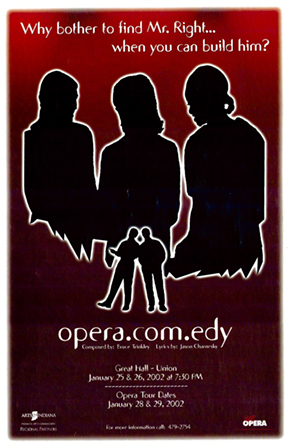
opera.com.edy (opera-dot-com-dot-ee, dee, why)
one-act comic opera
Three professional women (a surgeon, an engineer and a computer scientist) get sick of men and decide to build one for themselves. The trouble starts when their artificial man discovers he is a robot.
Kim, lyric soprano
Jeanine, soprano or mezzo-soprano
Laia, mezzo-soprano or alto
Adam, mezzo-soprano or alto
Martin, baritone or 2nd tenor
SSA Chorus (trio, sextet, or full chorus)
Accompaniment: Piano or chamber ensemble (fl, cl, bsn, horn, string bass, piano, perc.)
Duration: 80 minutes
Read Synopsis.
View Piano Vocal score
Watch Video of Western Illinois University Opera Theatre, Hainline Theatre, May 5, 2006
Commission and Premiere: University of Evansville Opera Theatre, Joseph Hopkins, director. January 25-29, 2002

The Trojan Women
Tragedy in one act
A contemporary retelling of the ancient story of war. The work brings home the tragic aftermath of all wars.
Hecuba: formerly the Queen of Troy, soprano
Helen: daughter-in-law of Hecuba, widow of Paris, wife of Menelaus, soprano
Andromache: daughter-in-law of Hecuba, widow of Hector, soprano or mezzo-soprano
Xena (Polyxena): youngest surviving daughter of Hecuba, mezzo-soprano
Cassandra: oldest living daughter of Hecuba, alto
Toby (Talthybius): Greek soldier, baritone
Astyanax: six-year old grandson of Hecuba, non-singing, non-speaking role
Greek soldiers, supernumeraries (non-singing)
Accompaniment: Piano or chamber orchestra
Duration: 75 minutes
Read Synopsis
View Piano Vocal Score
Preview three selections:
1. Cassandra’s Song: View Score. Listen to miidi.
2. Helen’s Plaint: View Score. Listen to midi.
3. Andromache’s Lament: View Score. Listen to midi.
Listen to midi of Part Two (pages 10-17).
Listen to midi of Part Three (pages 18-26).
Listen to midi of Part Four (pages 27-32).
Listen to midi of Part Five (pages 33-41).
Listen to midi of Part Six (pages 42-52).
Listen to midi of Part Seven (pages 53-62).
Listen to midi of Part Eight (pages 63-73).
Listen to midi of Part Nine (pages 74-81).
Listen to midi of Part Ten (pages 82-90).
Listen to midi of Part Eleven (pages 91-102).
Listen to midi of Part Twelve (pages 103-110).
Listen to midi of Part Thirteen (pages 111-119).
Listen to midi of Part Fourteen (pages 120-132).
Listen to midi of Part Fifteen (pages 133-141).
Listen to midi of Part Sixteen (pages 142-149).
The Trojan Women was written during a residency at The Helene Wurlitzer Foundation in Taos, New Mexico, in May and June of 2004.
Chamber Operas/Monodramas
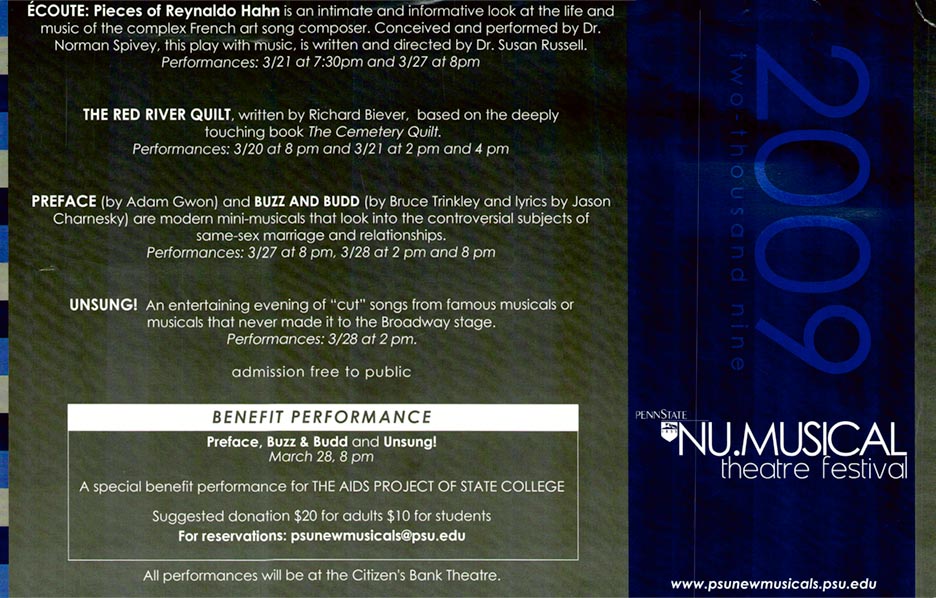
Buzz & Bud
Chamber Piece for Two Performers, Piano and optional Bass and Percussion
A faithful flower and a wayward bug discover they were made for each other in a fable of contemporary true love. For a long time biologists have known about the peculiar relations maintained between some orchids and certain wasps. The flower is able to confound the hornet's senses so completely that he mistakes the scent of the blossom for the lineaments of his dream date, and these two utterly different organisms enter into a complex, cross-species dance of partnership. Buzz & Bud is all about that difficult partnership of commitment, as seen from the point of view of the hornet and the orchid. Since this is a piece about soul-mates rather than body parts, the roles of Bud and Buzz can be played by either male or female performers. The model for the libretto was that sexy, gossipy medieval allegory The Owl and the Nightingale, while Buzz' attempt at rap was inspired by Lil' Kim, as heard on the remix of Puffy Daddy's "It's All About the Benjamins."
Bud, a flower. Medium or medium high voice
Buzz, a flying insect. Medium or medium high voice
Accompaniment: Piano with optional string bass and percussion
Duration: 21 minutes
Read Note from NOA performance. Read Libretto.
Download Piano Vocal Score.
View Youtube Premiere at Penn State.
Commission and Premiere: Penn State Numusic Theatre
Productions: Emporia State University, Penelope Speedie, Director; National Opera Association Convention, Santa Barbara, CA with Christopher Meerdink and Robert Hansen, tenors.
Confess\Confuse
The next three monodramas and Lost in Translation were performed together for the Philadelphia Fringe Festival under the collective title: Confess\Confuse directed by Richard Edelman and designed by Lea Asbell-Swanger. Then the three individual performers presented Lost in Translation as the finale. Each of the four pieces may be performed separately or in other groupings.
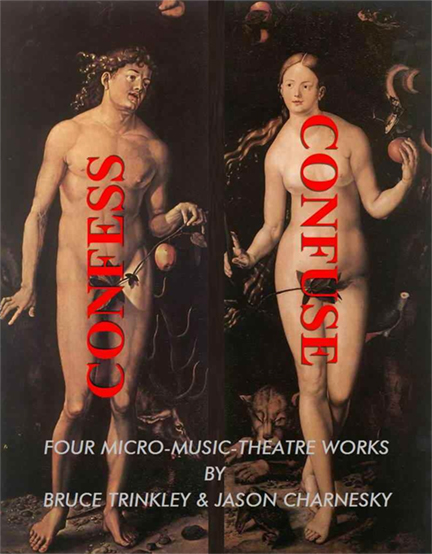
Paradise Reneged
Monodrama for soprano or mezzo and piano
Eve recounts her long life with Adam and the choices she has made.
Lyrical and poignant work and a tour-de-force for a singing actress.
Duration: 15 minutes
View Piano Vocal score. Read libretto.
View YouTube performance with Margaret Benczak, soprano;
Bruce Trinkley, piano; Rob Nairn, string bass.
Premiere: Theresa Vincent Smith, soprano; Steven Herbert Smith, piano. Faculty Composer’s Concert, Penn State School of Music. 2004.
Tour performances at National Opera Association Convention in NYC; Cornelia Street Café, Greenwich Village, NYC; Philadelphia Fringe Festival; Downtown Theatre Centre, State College, PA.
Cyber
Monodrama for voice (male or female) and piano
The first chat room opera! The drama takes place in both the real world and in the cyber community of a chat room, as the soloist creates three “personas”: Augustus, ruler of the western world; Missy, a young girl on the verge of maturity; and Edward the Second, King of England.
Duration: 15 minutes
View Piano Vocal score. Read libretto.
View YouTube performance with Raymond Sage, tenor; Bruce Trinkley, piano.; Rob Nairn, string bass.
Premiere: Raymond Sage, tenor; Bruce Trinkley, piano.
Tour performances at National Opera Association Convention in NYC; Cornelia Street Café, Greenwich Village, NYC; Philadelphia Fringe Festival; Downtown Theatre Centre, State College, PA.
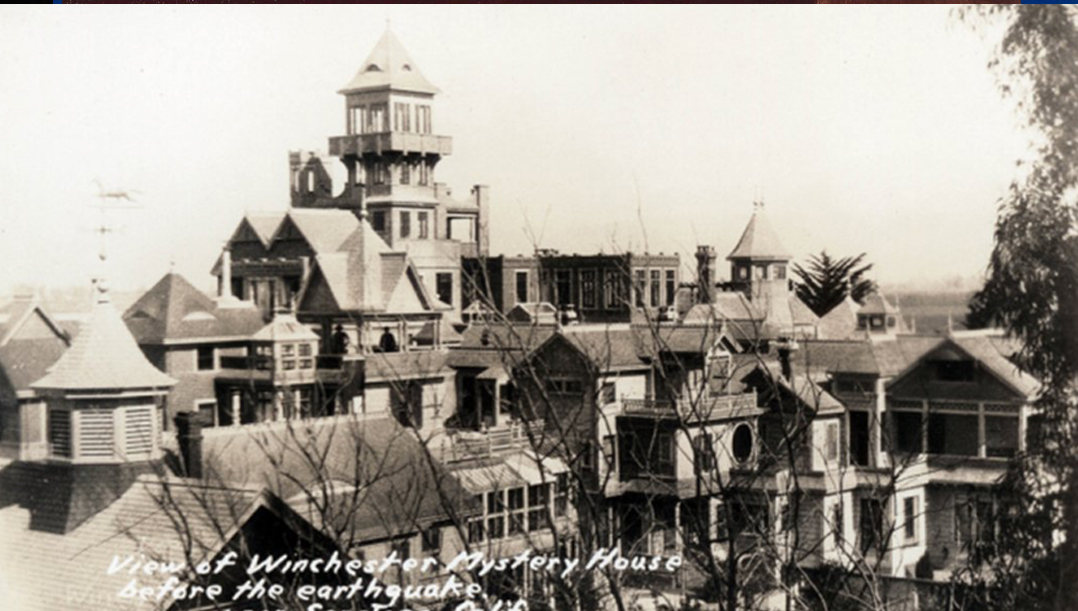
The Winchester Widow
Monodrama for soprano, piano and musical saw (optional) or chamber ensemble
Based on the true story of
Sarah Winchester (1839-1922) whose husband manufactured the rifle that won the West. She built a
mansion in San Jose, CA of 160 rooms to keep the ghosts at bay. A haunting evocation of obsession progressing into madness. The chorus of ghosts is pre-recorded by Sarah – are these ghosts for real or do they exist only in her fevered imagination?
Accompaniment: Piano with musical saw and optional string bass and percussion. Also available with chamber ensemble (flute, clarinet in Bb and A, oboe, musical saw, harp, string bass and percussion) or string quartet.
Duration: 22 minutes
Read Note and Synopsis. Download Piano Vocal Score.
View YouTube performance of The Winchester Widow presented as Part 3 of Confess\Confuse with Elisa Mathews, soprano; Natalia Paruz, musical saw; Bruce Trinkley, piano; Rob Nairn, string bass.
Commission and Premiere: Mary Kay McGarvey, soprano, and Natalia Paruz, musical saw. Queens College, New York, NY. Tour performances at National Opera Association Convention in NYC; Cornelia Street Café, Greenwich Village, NYC; Philadelphia Fringe Festival; Downtown Theatre Centre, State College, PA. Many additional performances throughout the US.

Lost in Translation
Chamber Opera for Three Performers
In this post- modern opera, two women vacationing in Greece converse exclusively through the phrases of their British guidebook. Charming, engaging, but finally tragic as the women come to grief in the arms of their Greek lovers. A story reminiscent of E.M. Forster. The libretto to Lost in Translation is constructed from a 19th century British tourist phrase book for Greece. The phrases have been rearranged so as to create a sort of minimalist E. M. Forster novel. The characters’ words all come from a phrase book, but their calamity is real: the loss of innocence and the sorrowful wisdom bestowed by unrequited love.
Narrator, baritone or tenor, soprano or mezzo-soprano
A, soprano
B, soprano or mezzo-soprano
Accompaniment: Piano with optional string bass or Chamber Ensemble
Duration: 15 minutes
View Note and Orchestration. Download Piano Vocal Score. Read libretto.
View YouTube performance with Elisa Mathews, Margaret Benczak, sopranos; Raymond Sage, tenor; Bruce Trinkley, piano; Rob Nairn, string bass.
Premiere: National Opera Association Conference, Roosevelt Hotel, New York City
Tour performances at Cornelia Street Café, Greenwich Village, NYC; Philadelphia Fringe Festival; Downtown Theatre Centre, State College, PA.
Memorial: A Letter to the Editor
Monodrama for Soprano
A woman writes to the editor railing against the godlessness she sees all around her. In the process she comes to a tormented realization about her own judgmental life. A very dramatic piece that presents an opportunity for a gifted actress to shine.
Accompaniment: Piano with optional String Bass
Duration: 18 minutes
View Piano Vocal Score. Read libretto.
Listen to midi of Part One (pages 1-12).
Listen to midi of Part Two (pages 13-19).
Listen to midi of Part Three (pages 20-26).
Listen to midi of Part Four (pages 27-33).
Premiere:
Mary Kay McGarvey, soprano, Queens College, New York
All Female Voices
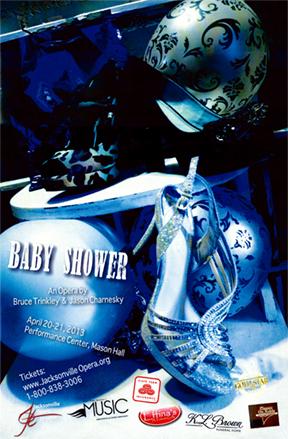
Baby Shower
A Comedy-Drama for 10 Female Voices
Winner: Fresh Squeezed Opera Competition 2015
Patty’s friends throw a shower for the mother-to-be, with surprise guest Nona, her great grandmother, who eventually brings a state of equilibrium to the zany family and friends of the honoree.
Accompaniment: Piano or Chamber Orchestra.
Duration: 55 minutes
View Synopsis and cast list.
View Orchestration.
Download Piano Vocal Score.
Read script.
View YouTube Premiere at Jacksonville Opera.
Commission and Premiere: Jacksonville Opera, Nathan Wight, Director, April 2013. Performances: Western Illinois Opera Theatre; Fresh Squeezed Opera, New York City at the 4th Street Theatre, June 18, 20 and 21, 2015. Maggie Rascoe, director.
Fresh Squeezed Opera production and photos.
Watch 5 minute excerpt from Fresh Squeezed Opera production.
Two Act Opera
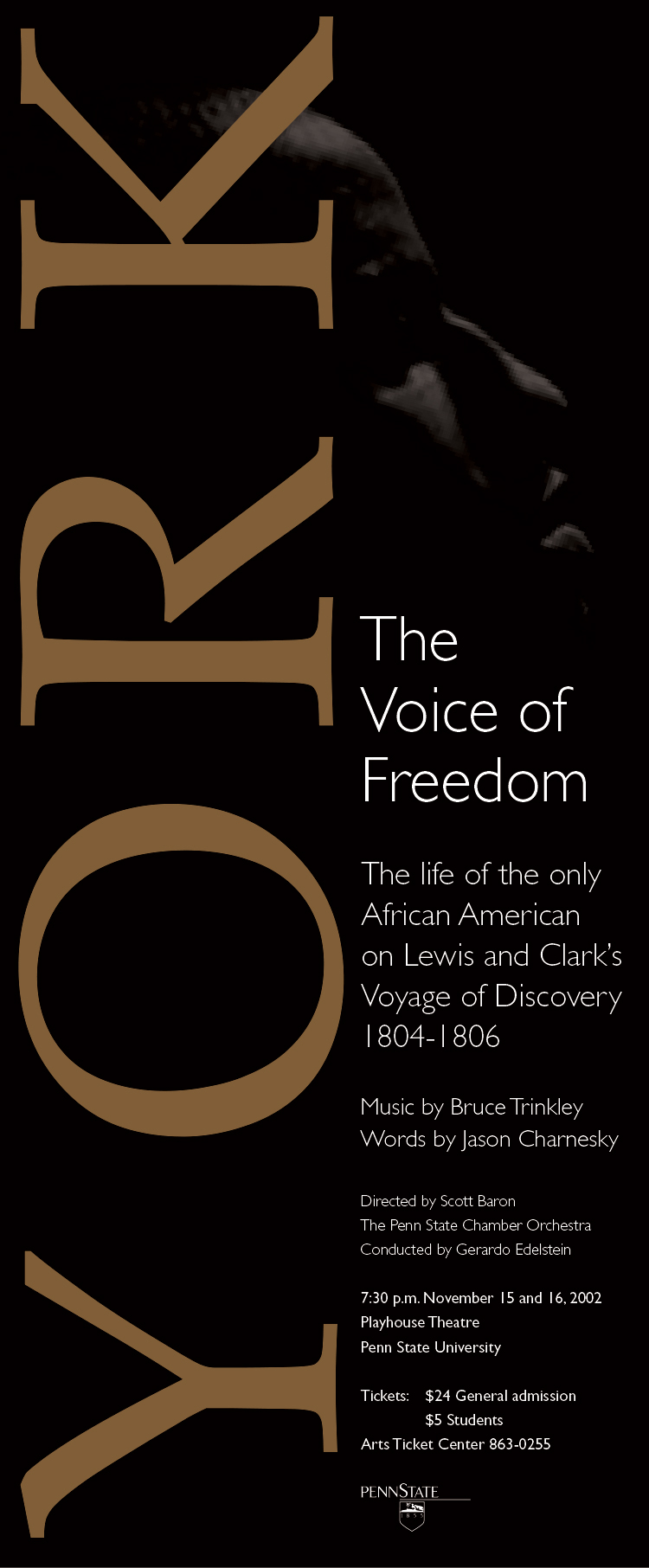
YORK: The Voice of Freedom
Music Drama in Two Acts
One man’s journey from slavery to freedom. York, the slave of William Clark, was the only African American member of the Lewis and Cark Expedition. The opera chronicles York’s twenty year struggle for freedom as he strives to join the woman he loves in a land where both may be free.
Mary, soprano or mezzo-soprano
York, baritone
William Clark, baritone or bass
Meriwether Lewis, tenor or high baritone
Thomas Brady, baritone
Corps of Discovery (men’s ensemble - minimum 6 tenors, 6 basses)
Women’s Ensemble (minimum 6 sopranos, 6 altos)
African American Ensemble (minimum 5 women, 5 men)
Other solo roles drawn from the Ensemble:
Sacajawea, soprano or mezzo-soprano
Easter, slave woman, soprano
Pacifica, soprano
Julia Hancock, soprano or mezzo-soprano
Sara Williams, contralto
Sergeant Charles Floyd, tenor
Thomas Jefferson, tenor
Messenger, tenor
Juba, tenor
George Gibson, tenor (and violinist)
John Ordway, tenor
Pierre Cruzatte, tenor (and violinist)
Patrick Gass, baritone
Ezekiel Williams, baritone
Reverend Whitsun, baritone
Brother Paul, black preacher, bass-baritone
Toussaint Charbonneau, bass
Crow at Rest, bass
Orchestra: Chamber orchestra
Duration: Two Acts, 2 hours 15 minutes
Commission and Premiere: Penn State Opera Theatre, November 2002. Scott Barron, Director; Patricia Heigel-Tanner, Choreographer; Gerardo Edelstein, Conductor; Charles Firmin and Lea Asbell Swanger, Lighting Designers; Laura Hanchar, Costume Designer.
With Leonard Rowe,York; Tamara Haskin, Mary; Brett Hyberger, William Clark;
Norman Spivey, Meriwether Lewis.
Filmed by WPSX-TV and broadcast on PBS stations nationwide.
View Piano Vocal Score: Act One. View Piano Vocal Score: Act Two.
Read short synopsis. Read full synopsis.
View Act One of WPSX production on YouTube
View Act Two of WPSX production on YouTube
Sacred Drama

St. Thomas the Carpenter
Sacred Drama for soloists, choirs and congregation
Based on the acts of Saint Thomas the Apostle who travels to India and teaches the true meaning of Christian charity. The work includes sections of congregational participation in which the congregation joins the performers in three familiar hymns, like Benjamin Britten’s cantata
Saint Nicolas (1948).
1st Lady, soprano
2nd Lady, mezzo-soprano
Empress, mezzo-soprano or alto
Saint Thomas the Carpenter, tenor
Presider, high baritone or second tenor
Abbanes, baritone
Emperor, bass-baritone
Children’s Chorus (unison, Fishes and Dolphins)
Adult Choir
Orchestra: Chamber ensemble, handbells, organ
Duration: 40 minutes
Read Synopsis. Read Libretto.
Download Piano Vocal score.
Download the 3 congregational hymns:
2. Teach Me, O Lord, Thy Holy Way
3. In Christ There Is No East or West
View Premiere performance YouTube. National Opera Association Convention, January 8, 2011.
Commission and Premiere:
National Opera Association Convention, January 8, 2011. Travis Park Church, San Antonio, Texas; Dr. Gary Mabry, Conductor, Samuel Mungo, Director; with the Texas Children’s Choir, Thomas Hardaway, Conductor.
Missouri State University Opera Theatre, Ann Marie Daehn, Director; Amy F. Muchnick, Conductor.
